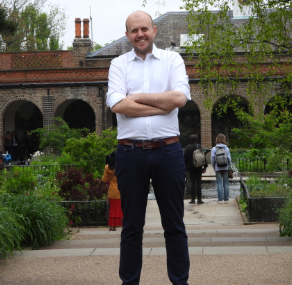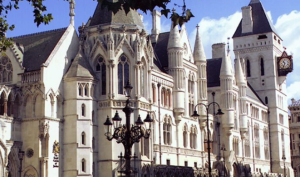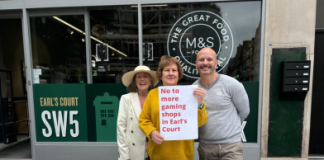Andrea Level does not mince her words when it comes to certain late-night venues in her local neighbourhood.
“In Earl’s Court we have faced a huge uphill battle trying to rein in the proliferation of betting shops and fast food takeaways,” she told the Local Democracy Reporting Service (LDRS). “These businesses like to operate 24/7 and bring nothing but ASB [anti-social behaviour] to the community.”
As a resident and Co-Chair of the Earl’s Court Society Planning and Conservation Group, Ms Level no doubt has a particular interest in the look and feel of the area.
But her concerns about gambling premises in particular are far from rare and are echoed beyond her corner of West London.
According to an ITV News article published in April, the number of gambling machines across the UK has surged since the pandemic from around 171,000 to 202,000.
In Brent, North London, an LDRS colleague has covered the council’s concerns extensively, in particular the rise of bingo licences for premises effectively doubling up as betting shops, or ‘adult gaming centres’ (AGCs).
The council recently published an assessment which it said demonstrates that gambling is a “public health issue”, and that people who live closer to a higher concentration of licensed venues have high rates of ‘problem gambling’.
In Earl’s Court it does not take long to understand why locals such as Ms Level are pushing back.

Within a few hundred metres of Earl’s Court Station, on Earl’s Court Road, there are a handful of such premises, including a neighbouring Coral and Admiral Casino.
Just across the road is a William Hill, offering ample options for anyone looking to place a bet.
Local politicians and residents banded together last year to oppose the installation of a 24/7 SilverTime casino along the same road in an old bank.
It was refused, but residents remain concerned about the cumulative effect of having such a concentration of gambling premises.
Ms Level said she believes a “reasonable terminal hour” for such businesses in a mixed residential/commercial area should be midnight, “in-line with licensing policy”.
She said: “What Earl’s Court needs is more businesses serving the local community – everything from our local pubs, the dry cleaners, restaurants like the ones in Hogarth Road, the Robert Dyas and our local barber shops, newsstand, flower stall and of course our independent cafés such as Over Under.
“We also like and support the larger multinational operations like Boots, M&S, the Co-op, Starbucks, LEON and Nero. We miss having a branch of Ryman. The newly refurbished Templeton Garden Hotel is fabulous. Those are just a few examples of the businesses that contribute to our area and are much valued.”
Ms Level said what is not needed is new premises such as gambling establishments, which she claimed “prey on our most vulnerable neighbours”.
Sandra Yarwood, a local resident who is Co-Chair of Planning and Conservation alongside Ms Level, as well as Vice-Chair of the Society, also said gambling premises are an issue.
“There are two slot machine places, SilverTime (has a 24/7 licence) and Admiral (in process of applying for 24/7 licence), and two old-style betting shops, Coral and William Hill, which are opposite each other,” she said. “They are all very close to each other and completely degrade the High Street.”
Ms Yarwood said the area would benefit from more small chain and independent restaurants and coffee shops, plus potentially a gym.
Cllr Linda Wade, a Liberal Democrat representative for Earl’s Court, told the LDRS the problem goes beyond simply gambling premises.
“I think that the issue is wider,” she said.”It is around the changing faces of our high streets, the promotion by the Mayor of a night time economy and where adult gaming and betting shops fit into those plans.
“The reality is that these adult gaming and betting operators tend to target areas that already suffer from deprivation, where there is a section of the population entirely benefit dependent as is the case with Earl’s Court.”
‘Listen to our residents’
Uxbridge Road in Shepherd’s Bush and Notting Hill Gate are two other localities not far from Earl’s Court where concerns have also been raised.
In Uxbridge Road, one resident the LDRS spoke to said there are nine betting shops either on the road itself or nearby, one of which is next to a primary school.
They added one of the nine, Shipley’s Bingo, appears to have recently been granted a premises licence for a venue by Shepherd’s Bush Green, despite it being acknowledged by the Met Police as one of the top 10 spots in London for ASB.
“We want Shipley’s hours to be significantly reduced and ideally closed down and repurposed for something in the community that actually serves the residents,” they said.
Similar to Ms Yarwood and Ms Level, the resident, who wished to remain anonymous, said Uxbridge Road is lacking venues such as bookshops or nail salons but does have a number of chicken takeaways and gambling premises, a situation they claimed was due to ‘neglect’ by the council.

In Notting Hill Gate, the Labour MP for Kensington and Bayswater, Joe Powell, is among those campaigning to oppose plans for a 24/7 SilverTime casino.
He told the LDRS: “Last year we successfully blocked the same operator from expanding in Earl’s Court and thousands of residents have backed my campaign to say they do not want more slot machines and gambling establishments on our high streets.
“I am calling on Kensington and Chelsea Council to listen to our residents and use every available lever, including planning and licensing powers, to prevent this latest proposal going ahead.”
What can councils do?
The Leader of Brent Council, Cllr Muhammed Butt, recently told the LDRS trying to prevent the growing number of gambling premises in the borough “feels like a losing battle”.
In the ITV article referenced above, a letter submitted to the Government by 36 councils and two Mayors argued current laws prevent local authorities being able to intervene “even if there is strong opposition to new premises being opened on their high streets”.
One action councils have been calling for is changes to the Government’s ‘Aim to Permit’ framework, which means that local authorities must prioritise approval.
Mr Powell told the LDRS: “I would also like to see the Government and the Gambling Commission reforming regulation of gambling shops and casinos, specifically tightening the ‘Aim to Permit’ rules to give licensing authorities more opportunities to oppose new licences.”
Asked for comment on the concerns raised about the Earl’s Court premises, a Kensington and Chelsea Council spokesperson said: “There is no direct evidence linking anti-social behaviour specifically with betting shops, but we are cleaning up Earl’s Court with our police partners. We introduced a public space protection order in 2024, which means we can fine against anti-social behaviour in the area. Since April 2024, we have issued 1,050 fixed penalty notices.
“Under national law councils have to ‘Aim to Permit’ gambling licences and we have little power to reject applications outright. However any applicants have to explain how they will prevent gambling from being a source of crime or disorder. In Earl’s Court, we last granted a licensing application for a betting shop in 2022.”
Fact Box
What is ‘Aim to Permit’?
According to the Gambling Commission, a public body which regulates venues such as arcades and casinos, the Gambling Act 2005 places a legal duty on the Commission and licensing authorities to intend to allow gambling “in so far as it is considered to be reasonably consistent with the pursuit of the licensing objectives”.
A description on the Commission’s website reads: “The effect of this duty is that both the Commission and licensing authorities must approach their functions in a way that seeks to regulate gambling by using their powers, for example, powers to attach conditions to licences, to moderate its impact on the licensing objectives rather than by starting out to prevent it altogether.”
Hammersmith and Fulham Council reviewed its gambling policy earlier this year, finding a link between clusters of gambling premises and areas of high deprivation and high crime/ASB.
It has since introduced a new policy looking to exercise more control regarding the introduction of new gambling establishments in the borough.
Its Local Area Profile (LAP), which informed the new policy, identified five gambling vulnerability zones and three cumulative impact areas, covering large sections of Uxbridge Road and King Street among other locations.
A Hammersmith and Fulham Council spokesperson said: “We share residents’ concerns about the number of betting shops and gambling premises on high streets. That’s why we’re leading the way locally and nationally in clamping down on those businesses which prey on some of the most vulnerable people in society.
“We’ve introduced a new tougher gambling policy to protect residents. The betting industry has launched a legal challenge to our policy but we will fight our case in court and continue to do all in our powers to protect residents and our local community.”
It is understood The Bingo Association and Bacta, the trade association and strategic body representing the amusements and low-stake gambling industry, including AGCs, requested a judicial review of Hammersmith and Fulham Council’s policy back in March.

Image: Judiciary.uk
A decision is yet to be issued by the High Court on whether the review can proceed.
Joseph Cullis, President at Bacta, said: “The legal challenge against Hammersmith and Fulham Council is about making sure the law is followed. ‘Aim to permit’ does not mean automatic approval – it means councils must assess applications fairly against the licensing objectives in an open, transparent and consultative way, ensuring all sides can be heard. Councils should focus on using the strong powers they already have, rather than creating new hurdles that go beyond what Parliament intended.”
The Bingo Association was also approached for comment.
‘One of the most tightly regulated licensing regimes in the world’
A spokesperson for the Ministry of Housing, Communities and Local Government (MHCLG) did not comment specifically on the ‘Aim to Permit’ rule.
They did however say the Government is committed to giving local authorities greater control over the location of certain premises.
The spokesperson told the LDRS: “Councils play a crucial role in the regulation of gambling at a local level and through the English Devolution White Paper, we committed to boosting their powers over gambling shops, so we can strengthen our communities and support healthier lifestyles.”
Mr Cullis said: “Our members operate within one of the most tightly regulated licensing regimes in the world. Venues are regularly inspected, must comply with strict conditions, and can have licences refused or revoked where licensing objectives are at risk. The law already gives local authorities these powers, and what matters is that they are applied consistently. Given that Bacta members contribute annually to a ringfenced local authority funding pot specifically for this purpose, there is understandable concern that too often this funding is not being used as intended.
“The Gambling Commission has rightly stated that while the industry and regulator must play their part in protecting players, local authorities also have a statutory responsibility they must meet. It is essential that these existing powers are fully and consistently used before calls for further changes are considered.
“There is no evidence that the simple presence of additional venues automatically leads to anti-social behaviour or problem gambling. What matters is how venues are run. Our members have operated safely in many of these communities for decades, providing low-stake entertainment, local jobs and a boost to high streets and coastal communities.”

Image: Bacta
A spokesperson for the Betting and Gaming Council (BGC), which represents high-street betting shops and land-based casinos but not AGCs, said: “Our members include the vast majority of high street betting shops and the land-based casino sector. We do not represent AGCs or the operators to which these licensing arrangements apply, and we therefore cannot comment on the specifics of these premises or their licensing routes.
“What we can say is that our members are proud of the role they play on hard-pressed high streets. Betting shops in the UK support 46,000 jobs, contribute £1 billion a year in tax to the Treasury and another £60 million in business rates to local councils. A study by ESA Retail found that 89 per cent of betting shop customers combine their trip to the bookies with visits to other local businesses.
“Each month, around 22.5 million people in Britain enjoy a bet. Whether that’s on the lottery, in bookmakers, casinos, bingo halls or online and the overwhelming majority do so safely and responsibly. The most recent NHS Health Survey for England estimated that 0.4 per cent of the adult population are problem gamblers.
“As set out in the Government’s White Paper on gambling reform, local authorities already have significant powers when considering licence applications. The White Paper confirmed that the ‘Aim to Permit’ requirement in Section 153 of the Gambling Act 2005 does not prevent the refusal of licences or the introduction of controls where necessary to minimise risk. It also committed to enabling councils to carry out cumulative impact assessments to support licensing decisions.
“The BGC engages constructively with government, parliamentarians and other stakeholders to ensure policies are evidence-led and balanced. At the same time, it is important to note that the number of betting shops and casinos in Britain has been falling in recent years, not increasing.”




